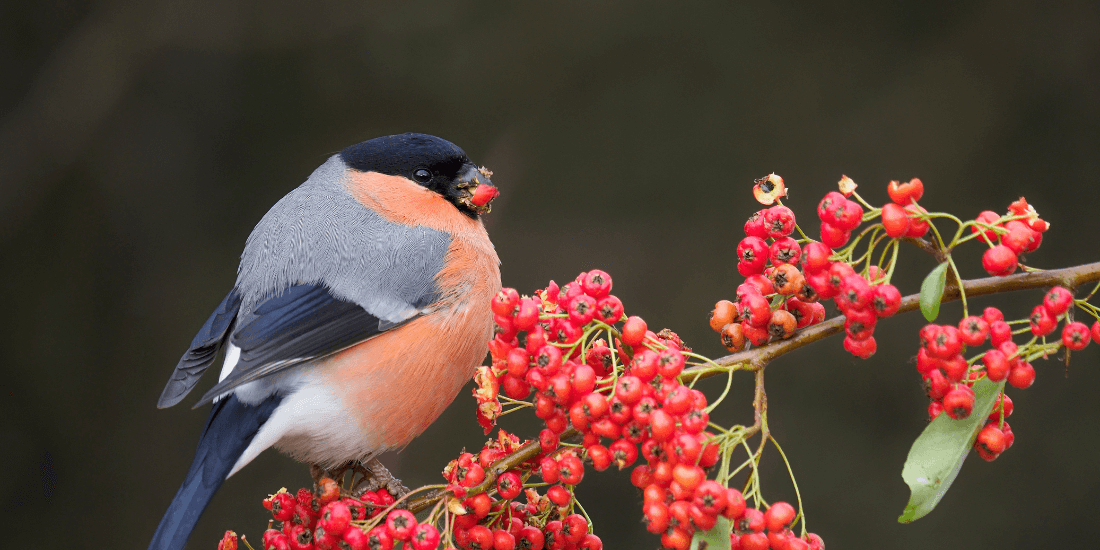What do birds eat?

Aside from worms, bugs, and the seeds we give them, you can’t help but wonder “what else do wild birds like to eat?” This post looks at the importance of natural and supplementary foods that are often overlooked. And we also aim to help answer a common question – “what do birds eat?”
Wild birds eat a combination of natural food, which they forage for alongside the supplementary bird food we provide.
Natural food, what do birds eat?
Birds love to feast on seed-bearing flowers
You are massively helping your local wild birds by adding seed-bearing flowers to your garden. Perennial flower species offer a long-lasting food source that will return year after year. We also advise you to choose a variety of flower types, colours, and heights for a stunning arrangement of flowers to attract a wide range of bird species.
Birds will also feast on holly, ivy, honeysuckle, sunflower and rose flowers. These plants are easily obtainable in the UK and a beautiful addition to any garden.
Tree Sap, buds, fruits, and seeds offer birds an abundance of nutrition
Trees produce an abundance of food for birds. Their buds, sap, seeds, and nuts give birds a wide range of nutritional benefits all year round. In the UK, there are trees that are ideal for feeding birds (both coniferous and deciduous). Trees like birch, holly, rowan, crab apple and many others are great food sources for birds. Trees also offer shelter from the weather and predators.
Shrubbery and its flowers are great food sources for birds
Shrubs produce flowers, fruit and nectar and are as beneficial as seed-bearing flowers and trees. They are a superb food source for birds and are often a good choice for smaller gardens where trees do not have space to grow.
Wild birds eat bugs and insects
A lot of wild bird species will take every opportunity to feed on bugs, grubs, ants, and flying insects. Some species will even choose to eat insects primarily over anything else. This is because bugs and insects give them protein to keep their strength and energy levels high.
Bugs and insects are equally important for baby birds. So much so that adult birds who primarily eat nuts and seeds will often focus on catching insects to feed their chicks. Above all else, you should avoid using pesticides in your garden to preserve their habitat!
Supplementary food, what do birds eat?
In the colder months, birds will often struggle to find enough natural food. This is more common in built-up areas with small gardens and inner-city developments with little space for trees, shrubs or wildflower meadows. In these situations, you can add bird feeders to help make their life easier. Adding bird food also attracts more birds to your area, so you can enjoy watching them as they feed.
There are times of the year when natural food is harder to come by, and wild birds have to work harder to get food. This is, without a doubt, an area where we humans can help!
Examples of beneficial supplementary foods
- Kibbled Maize: High in carbohydrates and oil. Maize is enjoyed by many species of wild birds and provides substantial nutrients all year round
- Striped Sunflower Seeds: Provides high energy. The fat and oil in these seeds are a healthy addition to their diet
- Peanuts: A boost of protein, energy, and oils to wild birds' diets. Gives them strength and energy for daily activities
- Suet: Made using animal fat that is mixed with grains or cereals to offer birds a tasty, balanced, and nutritious food source that they love
- Mealworms: Superb source of protein, healthy fat, and fibre. Helps birds grow strong, and it feeds their hunger all year round
- Safflower Seeds: Wild birds rely on protein and essential oils to stay healthy, and these seeds are packed full of both
- Nectar: Simple to make using sugar and water. Nectar gives birds a good source of pure energy and is a good supplement when the flowering season has ended
Our quality Supplementary bird food
At The Grass People, we have a range of high-quality birdseed mixes developed by the experts and Birdkind. These seed mixes give wild birds essential additions to their diet to help them thrive. The list of supplementary foods for birds is extensive, and there are too many to list here, but rest assured, our seed mixes give them the additional nutrition they require. Another key point is all our bird food mixtures come with our 100% wheat and filler-free promise.
- Winter Wellness Bird Food: high-energy bird food that’s very nutritious and oily, making it an ideal winter mixture.
- Robin Ready Bird Food: Attracts a range of birds like robins, wrens, thrushes, and blackbirds. This seed mix includes kibbled ingredients to suit these smaller beaked birds.
- Four Season Feast Bird Food: This food mix is a great option for feeding wild birds all year round. It includes a balanced variety of seeds, nuts, and oats, giving your garden birds a balanced meal all year round.
- Summer Glow Bird Food: Rich in nutrients and is ideal for use during spring and summer. This everyday feed helps to keep birds’ energy levels high.
- Everyday Essentials: This mixture offers a generous blend of fruit, nuts and seeds to encourage a variety of birds, big and small, to come to your garden and feast.
Feeding wild birds is important
As we have said, birds have a large supply of natural foods to keep them going most of the year. But the additional food offered by us humans certainly helps them thrive.
Remember, it's important to store your bird food carefully to keep it fresher for longer and safer for birds to eat. Likewise, make sure you clean your hanging bird feeders, feeding stations and bird tables.